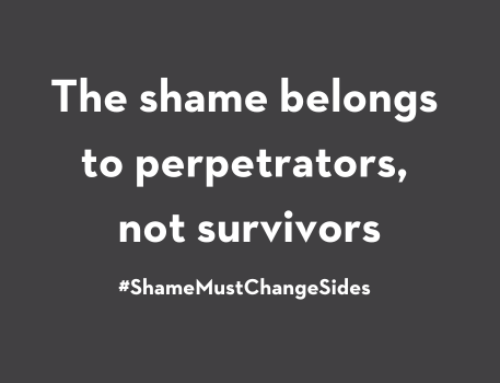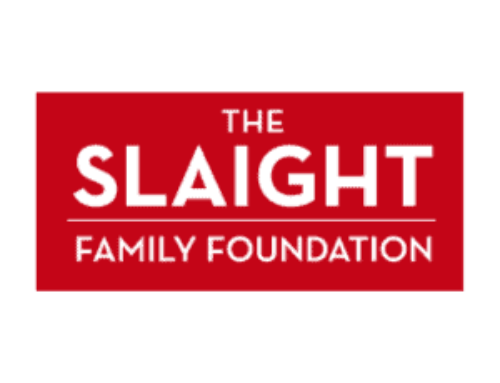
The women are members of Young Women at Risk, a weekly support group for women who have experienced violence. Each Thursday, they meet in a former classroom of a converted school, now an outreach centre for young mothers. The room contains a few chairs, a children’s playhouse in primary colours, two diaper change tables, and a folding table with an urn of stale coffee. The sound of children on their way to the playground can be heard echoing out in the hallway.
“It was such a relief to tell the truth,” Lisa is saying. She is 24, with shoulder-length blonde hair tucked behind her ears and two silver studs in her lower lip. Tattoos encircle her right wrist and disappear up into the sleeve of her navy blue hoodie.
“In this group, I could say, ‘Last night, he punched me in the head but tonight I’m going to cook dinner and act like nothing happened.’ And nobody here would ever say to me, ‘You’re stupid.’”
Beside her, 20 year-old Carolyn nods. “In other places, they’d say, ‘What’d you do to make him snap?’”
Vanessa, 21, is small and thin. She holds her inter- laced hands tightly against her body. “Or they’d say, ‘Leave, leave, leave.’ That’s easy to say, but sometimes you can’t.”
Carolyn stares at the floor. “If I hadn’t found this group,” she says, “I don’t think I would have kept talking about what was going on.”
For these women, this room is an oasis—the only place they can tell the truth about their lives and not feel judged. Because of that, they’ve not only found the courage to escape the violence, but are also working to end violence against all women.
The freedom to say what we think and feel is fundamental to our well-being: It signals that we believe in ourselves and honour our own experience. For women seeking transformative change, voice is the key that unlocks the door.
But why do we lose our voice in the first place?
Like many of the women in the Young Women at Risk program, Lisa, Vanessa, and Carolyn all grew up in violent homes. Some were removed from their families as children and placed into foster care or group homes. In their teens, some became homeless; all became pregnant. Along the way, they were often blamed for what happened to them, or not believed. By the time they entered the program, most of them had “zero” self-esteem, says Zahrah Hajali, the Outreach and Support Worker of Young Women at Risk.
But it’s not only women in abusive relationships who struggle to find their voice. To some extent, all women and girls learn the same lesson: Our issues, our stories, our points of view are not important. Like desert seeds that lay dormant waiting for rain, we remain silent.
For many women, the healing begins when we find a place where we are heard. Even then, trust can be a long time coming. For Vanessa, the unconditional support provided by the group came as a surprise. “The bond we have here is weird to me,” she says quietly. “I didn’t know non-judgmental people like this existed.” The next step is to begin trusting our own competence. To begin this process, Zahrah focuses on guiding each woman to set her own priorities and make her own decisions.
“Even if a woman experiences violence on a daily basis, that might not be her biggest worry,” says Zahrah. “Maybe she’s more upset that she can’t feed her kids or can’t afford bus tickets this month. Once we help her to get those basic needs met, she’s usually more able to focus on the violence. But it has to be on her own timetable.”
Lisa lived with a violent partner for 10 years and knew people judged her for staying. “I knew my mom wanted me to leave, so I would, even though I wasn’t ready,” she says. “I’d be back a month later. People think they’re helping by pressuring you to leave, but they’re not. It’s so much better to make that decision yourself. That’s how you get out, and stay out.”
Each week, Zahrah leads the group through different topics, but sometimes the best lessons come from the other women. What finally helped Lisa to leave was hearing other women in the group talk about how they’d gotten out. “It gave me hope,” she says. “Eventually it kicked in: Yeah, I can do that too.”
The women also learn how to listen more and judge less. As Carolyn says, “I used to be pretty judgmental, so it’s made me into a better person. I never knew I was capable of supporting other women this way.”
As they begin to realize their story not only matters but can actually help others, the women slowly begin to see themselves differently—not as victims but as agents of change.
Zahrah has witnessed many powerful moments of healing and transformation. One of the most memorable happened at an open house held to commemorate December 6, the anniversary of the Montreal Massacre. During the gathering, one of the group members suddenly stood up and started to speak.
“She’d never told her story before—she’d never even said she was a survivor,” says Zahrah. “But that day she spoke for 30 minutes, and she became more powerful with every word.” After that, the young woman was transformed; she is now in school and doing well. The moment had special significance for Zahrah, too. “I’m also a survivor, so I know how it feels to reclaim those lost parts of yourself.”
The open house was organized by the young women themselves, as one of the “empowerment projects” the group does throughout the year. The projects help them practise new skills that will eventually allow them to rebuild their lives.
On International Women’s Day the group organized a day-long community event they called HersDay. They did everything: created the schedule, chose the work- shop topics and speakers, designed posters, handled promotion, and prepared the food. When the day came, 150 people showed up; the vast majority were at-risk young mothers.
All day, the group members were praised for organizing such a great event. The words provided a powerful counterbalance to the usual negativity that scars their lives. “Their partners are constantly telling them they can’t do anything right, that they’re useless,” says Zahrah. “But after that day, those words would never again be internalized quite so deeply, because they know other people think they’re great. That’s a big success.”
Thanks to the Young Women at Risk group, Lisa, Carolyn, and Vanessa have all escaped the violence and are now rebuilding their lives. In the process, each is also reclaiming her voice—not just for herself, but for every woman living in violence.
Recently, the group marched together at the Ottawa Take Back the Night event. They wore matching bandanas and T-shirts with empowering messages and carried posters they made themselves.
Lisa says she found the experience overwhelming. “I just burst out crying,” she says. “It felt so good to be part of something that was for all women who’ve experienced violence just for being a woman. The fact that I was fighting back made me feel amazing.”
Carolyn sits up straighter in her chair. “It really opened my eyes. Being supported by 10 women in this group is amazing, but seeing hundreds of women together on the street tells you people are out there fighting back. Just think about the kind of impact we can have, together.”
The Young Women at Risk program is delivered by the Sexual Assault Support Centre of Ottawa and supported by the Canadian Women’s Foundation.
Learn More
-
Take the pledge to join GEN1 and help build the first generation free of violence against women and girls.
-
Sign up for our e-newsletter to have our latest stories and resources sent to your inbox.







